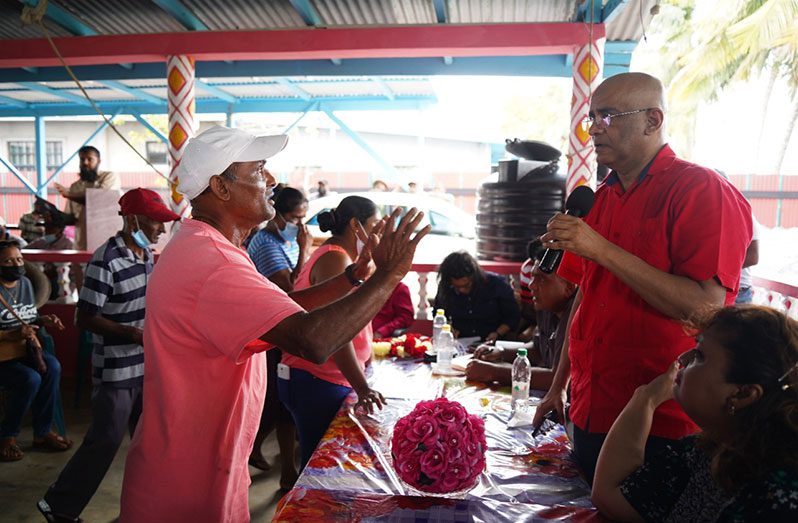— all efforts being made to cushion impact of high cost of living, says Vice-President Jagdeo
A SUGGESTION by farmers to dredge a section of the Essequibo River will be considered by government as it continues to look at ways in which it can help rice farmers to earn more from their crops.
The idea was pitched to Vice-President Dr Bharrat Jagdeo during an outreach on the Essequibo Coast earlier this week, who assured farmers that their recommendation will be examined.
However, the farmers did not identify a spot in the river that could be dredged, but said a point that enables them to directly ship their rice and paddy from the Essequibo Coast will minimise the cost they currently pay for shipment, and enable them to earn more for their produce.
The farmers made the suggestion to the Vice-President, who met with them to garner their views and examine ideas on what could be done to bring relief to them, in light of the high cost of living caused by COVID-19, which has been exacerbated by the war between Russia and Ukraine.
The pandemic has caused a significant slowdown in the global supply chain as major factories shuttered or shrank operations. This has resulted in a global shortfall in production, which has created a demand glut and along with market uncertainty, has been fuelling the increases in prices.
And amid the pandemic, Russia has invaded the Ukraine over alleged national security issues, resulting in a direct increase in the prices for wheat, as both countries are major producers of the commodity and the war has negatively affected their production.
Russia, a major global supplier of oil and gas, has since been hit by crippling sanctions from the U.S., the UK and the European Union because of its action in the Ukraine. These sanctions have affected Russia from selling its oil, resulting in a shortfall in global supplies and a concomitant increase in prices.
EXTERNAL FACTORS
Mr Jagdeo explained to the farmers that the rise in the cost of living are due to these external factors which are beyond Guyana’s control, but the government remains committed to doing all that it can to bring some relief to the rice farmers and farmers in general.
During the meeting, the farmers said that the current price of $3,600 per bag of paddy being paid by millers is a strain on them to operate viably and will require some help from government.
The prices for agriculture-related products have also increased, notably the price for fertiliser.
The Vice-President, in reasoning with the farmers, pointed out to them that the spike in prices for fertiliser is due to skyrocketing oil prices as fertiliser is made from petroleum products.
“Fertiliser is made from gas and crude oil, so if the price for the crude oil goes up, so too will the fertiliser prices, so although we removed all of the taxes, the price went up because the price of oil went up nearly 400 per cent,” he told the farmers.
Jagdeo, a former President, said the government is fully aware of the challenges face by not only the farmers but all local consumers and last Wednesday announced the slashing of the excise tax on gasolene and diesel from 10 per cent to zero, to help cushion the impact of the rising cost of living.
INVESTMENT
He also pointed out too that on assumption of power in August 2020, the government removed a slew of burdensome taxes, including VAT on fertiliser and other agricultural inputs. The government has also provided some $7.8 billion to farmers who were affected by the floods last year and continues to invest billions of dollars to modernise and improve production in the agriculture sector.
“This is a government that is sympathetic, there are things we can do and there are things we can’t do,” said the Vice-President, as he reassured farmers that the high cost of living will ‘level out’ once global production returns to normalcy, which he is hoping will happen sooner rather than later.
The farmers had also suggested that the government provide a monetary subsidy to them, so that they can earn $4,000 per bag of paddy like their Berbice counterparts. The Vice-President, who listened carefully, said this suggestion will also be examined.
During the meeting the farmers raised other issues, notably the non-payment for their paddy by millers, to which Mr Jagdeo told them that the law provides for them to move to the court to recover monies owed them and the government will support them moving in this direction.
They also complained about dockage issues with their paddy when submitted to the millers. This complaint caused a back and forth among the farmers and a miller present until it was agreed that the millers, rice farmers and the Guyana Rice Development Board officials will meet to settle the matter and report to the Vice-President in a week’s time.
At the series of meetings held with residents on the Essequibo Coast on Tuesday and Wednesday, the Vice-President heard complaints about missing NIS records, the process of issuing birth certificate, the need for an expert to be stationed in the region to deal with bees, the need for greater attention for the differently abled, the need for more police patrols in some areas, flooding and land issues.
The latter was a dominant feature at all the meeting. The Vice-President after listening to the residents mandated that both ministers of Housing and Water visit the region earliest and rectify the land issues that could be addressed at the level of the government. He also noted that the government will be building drainage and irrigation structures similar to the Hope Canal in the regions affected most by flooding to bring relief to the residents frequently affected.











